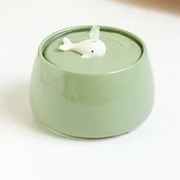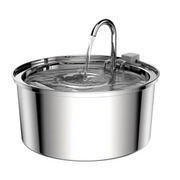Can Cats See in the Dark?
Cat Water Fountains Australia
Share This Article
Ever watch your cat stalk a toy mouse in near darkness, leaving you fumbling for the light switch? Cats possess an uncanny ability to see in low-light conditions, a superpower that fuels their nocturnal instincts. But what allows them to navigate with such ease where we stumble? Understanding their unique vision is key to appreciating their world and ensuring their well-being.
Seeing in the Dark: A Cat's Eye Advantage
Unlike humans, who rely heavily on cone cells for colour vision in bright light, cats are the ultimate night owls when it comes to sight. Their eyes boast several key features:
1. Tapetum Lucidum - This reflective layer behind the retina acts like a mirror, bouncing light back for a second chance at detection. It's like having built-in night-vision goggles!
2. Rod Cell Power - Cats have far more rod cells, highly sensitive to light and movement, compared to our cone-dominant eyes. This allows them to detect even the faintest flicker in dim environments.
3. Wider Field of View - Cats have a broader visual range than us, offering a panoramic view for spotting prey or navigating tight spaces at night.
4. Adaptable Pupils - Their pupils can morph from narrow slits in bright light to large circles in darkness, maximising light intake.
Beyond Night Vision: Setting the Record Straight
While impressive, their vision comes with limitations:
-
Not Total Darkness - Though exceptional in low light, cats still need some light to see entirely.
-
Shades of Blue and Grey - Contrary to popular belief, cats likely see in a reduced colour spectrum at night, with blue and grey dominating their vision.
- Limited Distance Clarity - Their night vision prioritises movement and shapes over faraway details.
Keeping Your Cat's Vision Sharp
You can play a role in supporting your feline friend's night vision:
-
Veterinarian's Advice - Regular vet checkups are crucial for detecting potential vision problems early on. Early intervention can significantly improve your cat's quality of life.
- Dietary Support - Ensure their food is rich in Vitamin A and taurine, essential nutrients for healthy eyes and night vision.
A World Through Cats Eyes
By understanding the science behind your cat's vision, you gain a deeper appreciation for their world. Remember, healthy eyes are vital for their overall well-being. Schedule regular vet checkups and provide a supportive environment to ensure your furry friend can continue their nighttime adventures with confidence.
Note: The information provided in this article is for educational purposes only and should not be taken as veterinary advice. Always consult with your veterinarian before making any changes to your cat's diet or healthcare routine.









